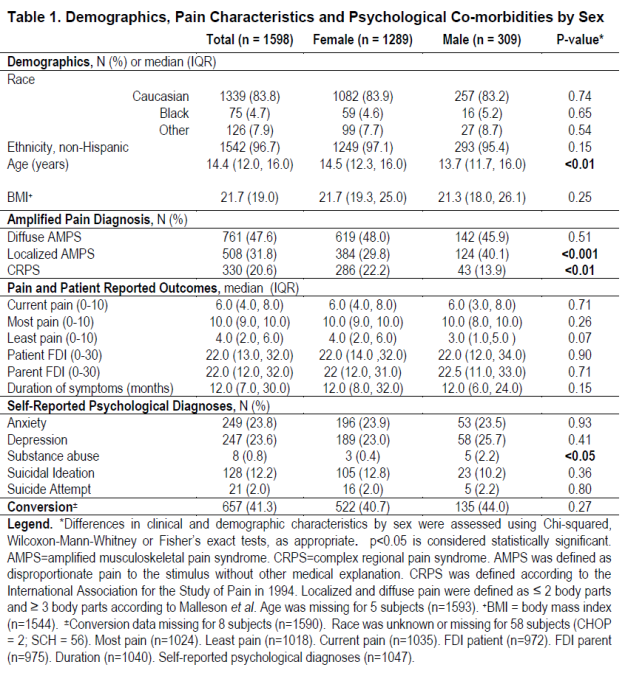Session Information
Session Type: Abstract Submissions
Session Time: 5:30PM-7:00PM
Background/Purpose: Amplified musculoskeletal pain syndrome (AMPS) is a chronic non-inflammatory musculoskeletal pain condition. AMPS has a predilection for females but males can be affected as well and sex differences in this patient population are poorly understood. We aimed to describe the various phenotypes of pediatric AMPS in a large cohort and test for differences in presenting features based on sex.
Methods: We performed a cross-sectional cohort study of subjects diagnosed with AMPS (including complex regional pain syndrome (CRPS) and fibromyalgia) between February 2001 and October 2015 at two large tertiary care medical centers: The Children’s Hospital of Philadelphia (CHOP) and Seattle Children’s Hospital (SCH). Subjects were ≤ 21 years of age at diagnosis. Information collected included age; sex; race; ethnicity; past medical and psychological history; conversion symptoms; and primary pain diagnosis. Pain location, duration and functional disability measures were documented for a subset of subjects. Differences in demographic and clinical characteristics based on sex were tested using the Wilcoxon-Mann-Whitney, Fisher’s exact or Chi-Squared test.
Results: This study included a total of 1598 subjects (66% from CHOP). The most common primary pain diagnosis was diffuse AMPS (47.6%) followed by localized AMPS (31.8%) and CRPS (20.6%) (Table 1). Subjects were predominantly non-Hispanic (96.5%), Caucasian (83.8%) and female (80.7%). The median age at presentation was 14.4 years (IQR: 12.0, 16.0). Boys were younger than females at diagnosis (median age 13.7 versus 14.5 years; p<0.01). Males were more likely to have localized AMPS (40.0% vs. 29.8%; p<0.001) and girls were more likely to have CRPS (22.2% vs. 13.9%; p<0.01). With regard to anatomical locations affected, males were more likely to have groin (p<0.001) and abdominal (p<0.01) pain. Females were more likely to have pain in the upper and lower extremities (all p<0.05). The presence of conversion symptoms was overall similar among the sexes (p=0.27) although visual disturbances appeared to be more common in females (12.5% vs. 8.8%; p=0.07). Preceding duration of symptoms (median 12 months; IQR: 7, 30), pain and Functional Disability Inventory (FDI) scores. Anxiety, depression and suicidality did not differ between the sexes (all p>0.05), while substance abuse was more common among males (p<0.05).
Conclusion: Significant sex differences exist in the presentation of AMPS. Males were younger and more likely to have localized AMPS whereas females had more CRPS. Males tended to have pain in the core whereas pain was located in the extremities in females. Psychological comorbidities were common with substance abuse more prevalent among males. Future studies should explore the biological and/or social constructs underlying these sex differences.
To cite this abstract in AMA style:
Gmuca S, Tress JL, Mosby J, Richardson LP, Sherry DD. Presenting Manifestations of Amplified Musculoskeletal Pain Syndrome in Males versus Females [abstract]. Arthritis Rheumatol. 2017; 69 (suppl 4). https://acrabstracts.org/abstract/presenting-manifestations-of-amplified-musculoskeletal-pain-syndrome-in-males-versus-females/. Accessed .« Back to 2017 Pediatric Rheumatology Symposium
ACR Meeting Abstracts - https://acrabstracts.org/abstract/presenting-manifestations-of-amplified-musculoskeletal-pain-syndrome-in-males-versus-females/

